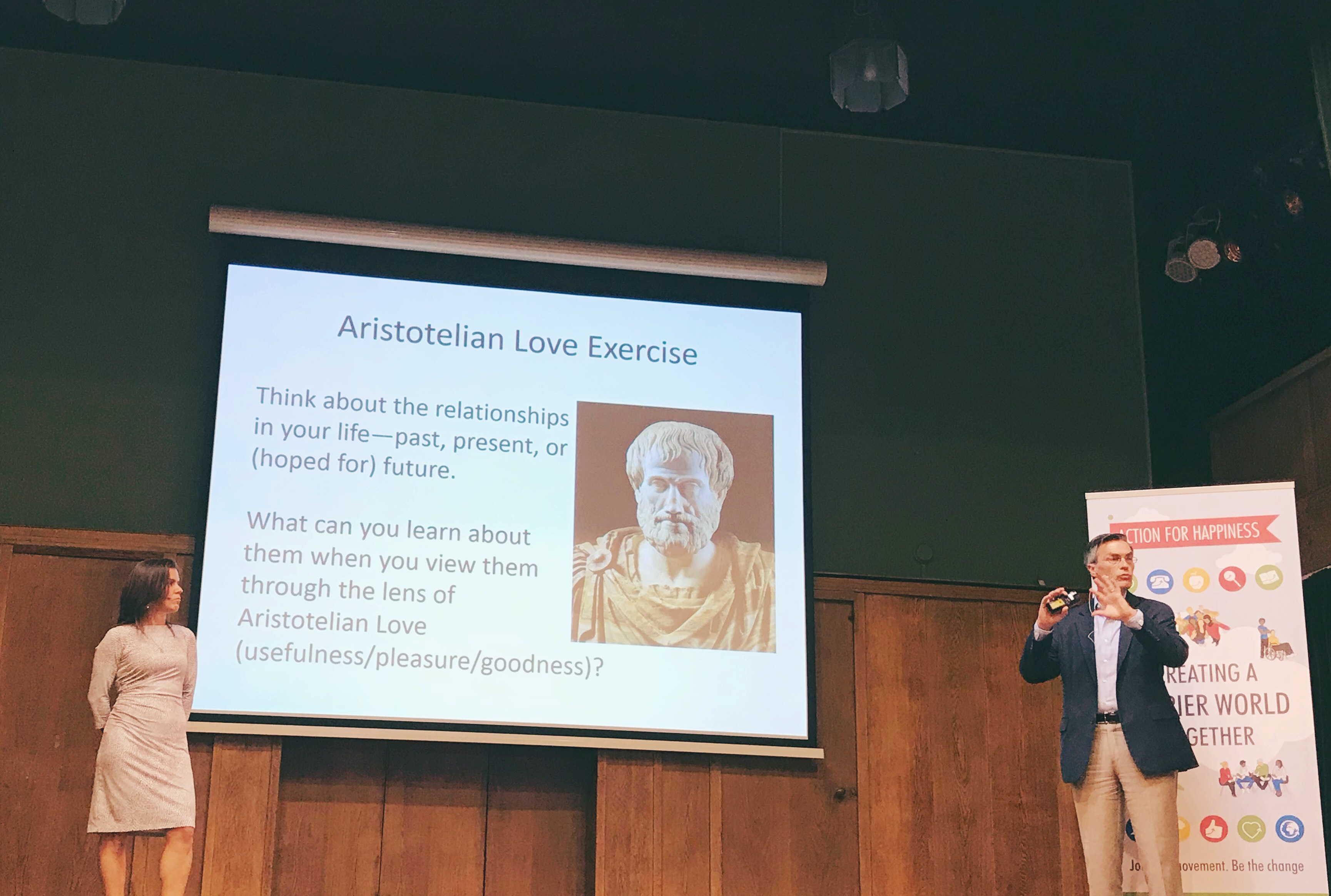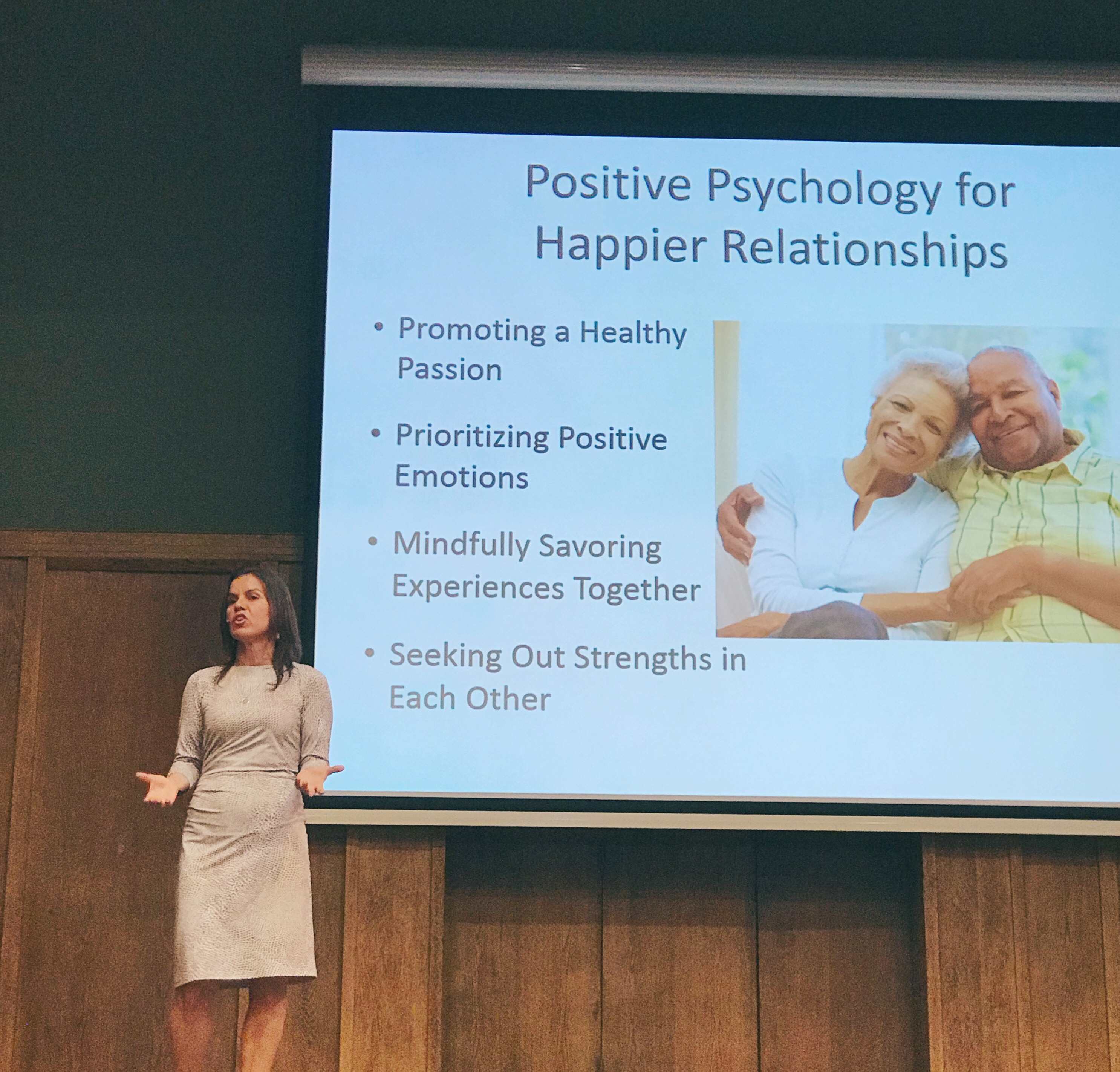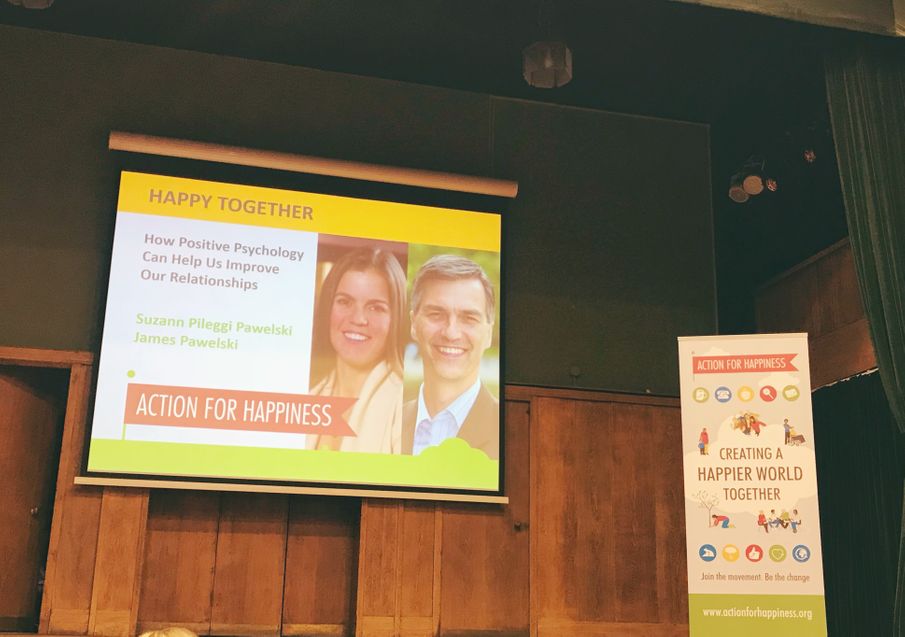We spent an evening with married couple Suzann and James Pawelski, talking positive psychology, Aristotelian love and why we find it so hard to take a compliment
I like to think I have a healthy and happy relationship with my partner. We’ve been together two and a half years and moved in with each other at the start of this year, so I guess you could say we’re still in the ‘honeymoon period’.
Still, I’m always eager to learn more about keeping a relationship strong and happy, so I was very interested to see Action for Happiness putting on a talk about positive psychology and how it can be used to improve relationships. As I later learned, this was in fact their first talk that delved into the topic of relationships.
Mark Williamson, Director of Action for Happiness kicked off the evening with a question for us to discuss with our neighbour:
“What is one thing you do with your partner, friend or family member that makes you feel connected?”
As soon as he posed the question, a scene of my partner and I going out for coffee came to mind. It’s something we do often and something we both really enjoy. Sometimes we’ll take our books, other times we’ll just talk. Coffee shops have become a backdrop for so many wonderful conversations.
As I told my neighbour for the evening about this simple act that makes me feel connected to my partner, I saw a longing look in her eyes. She explained that her partner suffers with his mental health and going out for coffee is something she misses being able to do. Instead, talking on the phone and FaceTiming has become their key way of connection. A stark reminder of how all relationships are different and face their own challenges.
Vanessa King, Head of Workplaces and Positive Psychology at Action for Happiness introduced our hosts for the evening, Suzann Pileggi Pawelski (a freelance writer and wellbeing consultant with a master of applied positive psychology degree) and James Pawelski (a philosophy fan and professor of practice and director of education in the Positive Psychology Center at the University of Pennsylvania).

They started the discussion with a quick overview of positive psychology, explaining how it was developed 20 years ago when psychologist Martin Seligman saw the need for a focus on what goes right with our mental health. Up until then, psychology focused on diagnosing and understanding mental illness; positive psychology is all about understanding mental wellness and is often described as the ‘science of happiness’.
A key part of mental wellness is connection and relationships – whether it’s romantic relationships, family relationships or the friends and colleagues we surround ourselves with. Suzann and James were particularly interested in this aspect and authored the book ‘Happy Together’ which goes into depth about positive psychology and relationships.
What I instantly liked about Suzann and James was there grounded approach to relationships. They were keen to bust myths and the first one they tackled (with a little help from Jerry Maguire) was the idea of someone ‘completing you’ or being your ‘other half’.
This concept can lead people to believe love is this great bg mystic force that will make us ‘complete’ and happy, and (sorry to ruin your day) this isn’t true. Instead, Suzann and James discussed the importance of interdependence within a relationship suggesting “you compliment me” as an alternative statement.
Next we got on to some philosophy…
James spoke about Aristotle and his theory that friendships revolve around 1) what is useful, 2) what is pleasurable and 3) what is good. A discussion on the couple’s honeymoon lead them to think about how we surround ourselves with people who are useful (those who help us with things), pleasurable (those always up for a good time) and good (those who we truly see the good in).
When we see the good in others, it often prompts us to want to be a better person. And this is something that can be a backbone of many successful relationships.
The couple then moved onto the meat of it – positive psychology for happier relationships. A few key areas were highlighted:
- Promoting a healthy passion
- Prioritising positive emotions
- Mindfully savouring experiences together
- Seeking out strengths in each other

They made an important point here about passion, and that it shouldn’t be obsessive or all consuming (as it is so often portrayed in movies). A closer look into the idea of strengths revealed a category called ‘giving and receiving strengths’, which include our capacity to love and be loved, forgiveness, kindness and gratitude.
Gratitude was highlighted and we delved into the benefits of gratitude within relationships and importantly, our reactions to gratitude.
Suzann made the point that for many of us, receiving a compliment makes us feel vulnerable and open, and for some of us this proves difficult. This can result in us deflecting the compliment, reciprocating it or even discounting it. Reactions that I’m sure we can all relate to.
They explained how these sorts of reactions can make the compliment giver feel, and suggested some better ways of reacting to compliments. One of the take-away lessons from the talk came here as the duo suggested the next time your partner/friend compliments you, to ask why it resonated with them. This gives you the opportunity to learn what they value in your relationship.
Another top tip was to make sure your ‘thank yous’ are centred around them, not yourself
So instead of “Thank you for my present, I love it, it will be perfect for XYZ…” try to put the focus back on them, “Thank you for my present, you really thought about this and how it would be perfect for XYZ.”
Finally the couple discussed the idea of a strengths date. They suggest finding out what your strengths are (you could either take some time to list out what you feel your strengths are, or take this survey) and planning a date that combines both of your strengths.
For example, Suzann has a love for adventure, while James enjoys learning, so the couple had a date that involved a segway tour. Suzann got her adventure fix while James got to learn about the history of the place they were visiting.
Leaving the talk my mind was bubbling over with ideas. When I arrived at Waterloo, ready to catch my train home, I spotted everything was delayed. A quick Google revealed that sadly someone had walked onto the tracks in an attempted suicide.
Any frustration I had about getting home late dissipated as I was reminded how important it is for us to not only address mental illness and support those in need, but work towards prevention and encourage people to take an active interest in their mental health.
I gave my partner an extra squeeze that night, thankful for him and for our relationship, vowing to keep working at happiness together.


Comments